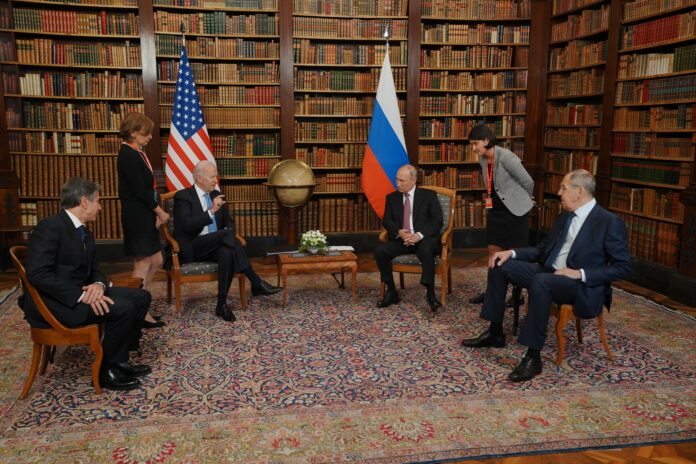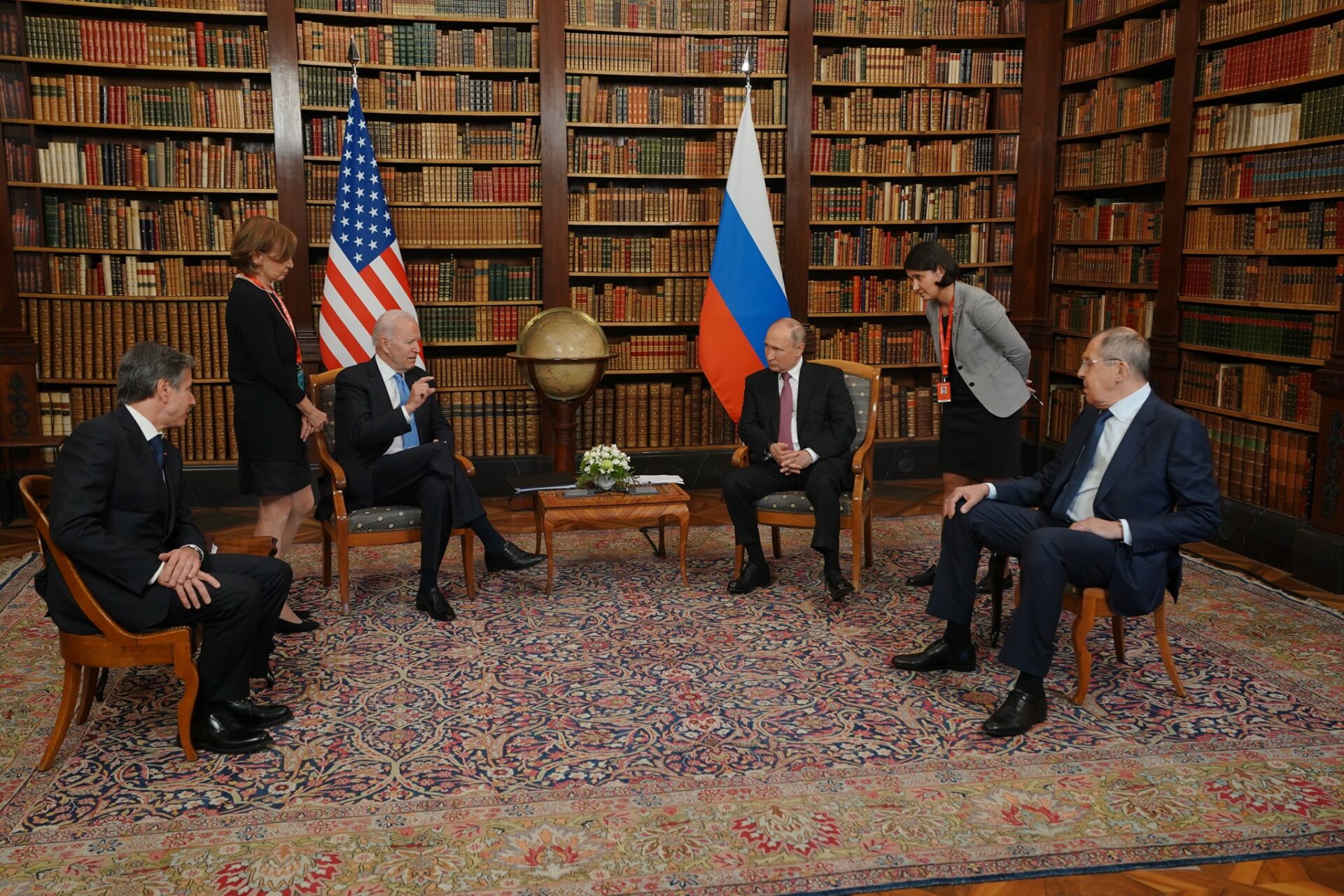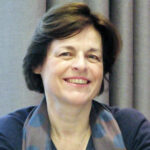In Geneva on June 16, the American and Russian presidents, each in their own way, acknowledged that they had agreed on nothing, except that they should seek to get along better. The Geneva summit was indeed a meeting between two adversaries, not a conversation between two strategic partners.
Naturally, both sides announced that the three-hour exchange had been “constructive,” with a commitment to further discussions, and the formation of working groups on disarmament and cyber-attacks. But the separate and successive press conferences of Vladimir Putin and Joe Biden conveyed a different message: each stuck to his guns and denied the other’s assertions.
On the evening of June 16, the Putin media found the right thread. They circulated Donald Trump’s insulting comment to Joe Biden on Fox News: “It was a good day for Russia! We gave a very big stage to Russia, and we got nothing!” The former President of the United States rejoiced at the humiliation of his successor. Social networks did the rest. A summit for the headline, with Vladimir Putin, is always risky, because the Russian leader, master of disinformation and subversion, shapes the tête-à-tête as he pleases. The lesson is worth remembering: never deliver to Internet users an oversized event for an anticipated non-result, unless your story makes the buzz online first. In this little game, the democrat is unlikely to have the last word against the autocrat, who can leisurely align untruths and inappropriate allusions.
For Joe Biden, the challenge was to emerge victorious from this diplomatic ritual through dignity and confidence. However, American journalists who, unlike the Russians, freely exercise their profession, have dented the image of the “constructive” summit. As he concluded his press conference and walked away from the microphone, Joe Biden made the mistake of answering CNN’s White House correspondent Kaitlin Collins, who questioned him about the lack of convincing results, asking him if he really expected Putin to amend his position in the coming months. Tired, annoyed, the president tried to justify himself, then raised his voice and turned his back. He apologized a little later, before taking off from Geneva.
In the United States, the media is the fourth power. In Russia, there is no longer a second or third power, in the absence of a parliament and justice worthy of the name.
This summit between the former “superpowers” had a modest objective: a first encounter between the two presidents. It is this lack of ambition that fueled disparaging comments. The three hours of conversation confirmed the predictions: a tennis game of discordant accounts and mutual criticism. To save the day, the “convergence” on climate and disarmament was recalled. And, in order to avoid a no-deal, the return of the two ambassadors in Washington and Moscow was announced (the decision had already been taken), as well as an improbable working group on cyber security. This issue was Joe Biden’s main demand in Geneva: that the Russians stop cyber-attacks against institutions, organizations and people in America and Europe. He even gave his Russian counterpart a list of sixteen structures that should not be targeted, under risk of serious retaliation.
During his press conference, which preceded that of Joe Biden, Vladimir Putin replied that, on the matter of hacking, Americans were the champions (referring to a curious count of formal complaints against the United States). Thus, the future bilateral working group would appear like a concession of the Russian president to his American counterpart overwhelmed by his own cybercriminals…
Vladimir Putin, flanked by two Russian flags, regretted that Biden treated him as an enemy. And Joe Biden, flanked by two American flags, opened his press conference with a short lesson in political liberalism: “Our country is founded on an idea: men are born with rights”. Was this the time and place to recall the famous “We, the People” that opens the U.S. Constitution? And to imply the supremacy of democracy over autocracy?
The Russian leader acted the athlete challenging a 78-year-old Biden, who later oddly mentioned their ten-year age difference. Putin took all the questions, from American as well as Russian journalists, for an hour, while Biden lasted 30 minutes, answered only to “home” journalists and managed to tangle up in a final answer.
Putin was aggressive, nervous, and snappy. He kicked the ball with open bad faith. He had his audience waiting for his show. As a good propagandist, with the know-how of two decades in the KGB, he took his time to impose his narrative, with a certain verve and always a nasty sneer when it came to Alexey Navalny (whose name he never pronounces), the main democratic opponent, locked up in a penitentiary, after having been poisoned with Novitchok by Russian intelligence agents in August 2020. When asked about police repression in Russia, Putin replied with his usual “Whataboutism” rhetoric: “What about George Floyd?” In France, we remember the uncomfortable summit between Emmanuel Macron and Vladimir Putin at the Fort de Brégançon in August 2019. The Frenchman delivered his little sermon on the violations of rights and freedoms in Russia; the Russian recalled the casualties from the yellow vests “riots”.
Asked about Belarus and Ukraine, Vladimir Putin evaded the question, or lied. Since the spring of 2014, he adamantly denies the Russian military intervention in Donbas, in the east of Ukraine. Not a word about Syria and the Middle East either.
Let’s recall that Biden first mentioned the possibility of a summit in April 2021, to stop Putin’s war scare at the Ukrainian border. The Russian army had amassed nearly 150,000 troops and was threatening to enter Donbas to supposedly defend the “Russian population” against a “U.S.-controlled” Ukrainian government.
Thus, the Kremlin leader took advantage of the Geneva event to present himself as a reasonable, non-interventionist statesman, who opposes American and Atlantist ambitions. Although this pretention does not deceive informed officials and observers, it fuels Putin’s disinformation machine. The autocrat can openly lie and disregard his opponent’s position, while the democrat can neither lie nor dismiss the autocrat’s words in public. The fundamental difference between the two political systems makes the dialogue asymmetrical: one is accountable while the other is not.
Vladimir Putin needs Joe Biden more than Biden needs Putin. And yet, the Russian autocrat almost succeeded in reversing the positions in Geneva. For Putin, the primary goal of the exercise was to gain recognition of Russia’s “great power” status. During his press conference, he repeated: “we are the two biggest nuclear powers”, so it is our common responsibility to talk to each other and get along. For the autocrat, it is vital to always dissociate the “superfluous” – human rights, parliamentary debate, free criticism, political opposition – from the “essential”: the military and nuclear security of the big states; domestic “order” against democratic “disorder”. In reality, the Putin regime’s priority is its own survival, at all costs. And to justify this priority, it is necessary to convince Russians and foreigners that the end of Putinism would provoke chaos, not only in Russia, but also in the European continent, and even worldwide.
The American president wanted to be the voice of a universal vision, and reclaim the leadership of “the free world”. However, the Europeans did not participate in the summit, nor did they give Biden the mission to speak to Putin on their behalf. Fortunately, the most important meetings were held in Europe, notably on June 14 and 15 in Brussels, where President Biden renewed America’s commitment towards its western allies across political, economic, and security matters.
A diplomatic summit without political ambition is a double-edged sword. Why hold a high profile event if you don’t discuss your disagreements on camera? The lesson is that a tricky bilateral encounter cannot be properly concluded with two separate and hostile narratives. It would have been preferable to do without press conferences, or dare to hold a joint conference, or simply abandon this diplomatic genre inherited from the Cold War. In today’s world, seeking the personal touch does not help the crafting of a more sustainable relationship with a rival power.
To go further: Nicolas Tenzer, Why Joe Biden must make Vladimir Putin lose, Politico, June 16 2021.
Marie Mendras is a professor at Sciences Po and a researcher at CNRS. She specializes in Russia and Ukraine. She has taught at the London School of Economics and Hong Kong Baptist University and has been a visiting researcher at Georgetown University and the Kennan Institute in Washington. She is a member of the journal "Esprit" and its Russia-Europe Committee.
Marie Mendras has authored several publications, including Russian Politics: The Paradox of a Weak State (Hurst, 2012), Russian Elites Worry: The Unpredictability of Putinism (Transatlantic Academy, 2016), and articles such as "Navalny: La vie devant soi" in Esprit (Jan-Feb 2021) and "Le chantage à la guerre" in Esprit (June 2021).




